Lord President of the Council
The lord president of the Council is the fourth of the Great Officers of State of the United Kingdom, ranking below the Lord High Treasurer but above the Lord Keeper of the Privy Seal. The Lord President usually attends and is responsible for presiding over meetings of the Privy Council of the United Kingdom, presenting business for the monarch's approval. In the modern era, the holder is by convention always a member of one of the Houses of Parliament of the United Kingdom, and the office is normally a Cabinet post.
| Lord President of the Council | |
|---|---|
.svg.png.webp) Arms used by the Privy Council Office | |
.jpg.webp) Penny Mordaunt since 6 September 2022 | |
| Privy Council Office | |
| Style | The Right Honourable |
| Type | Great Officer of State |
| Appointer | The King (on the advice of the Prime Minister) |
| Term length | At His Majesty's pleasure |
| Formation | 1530 |
| First holder | The 1st Duke of Suffolk |
| Salary | £151,649 (including £84,144 MP salary) |
| Website | privycouncil |
| This article is part of a series on |
| Politics of the United Kingdom |
|---|
.svg.png.webp) |
|
The office and its history
The Privy Council meets once a month, wherever the sovereign may be residing at the time, to give formal approval to Orders in Council.[1] Only a few privy counsellors need attend such meetings, and only when invited to do so at the government's request. As the duties of the Lord President are not onerous, the post has often been given to a government minister whose responsibilities are not department-specific. In recent years it has been most typical for the Lord President also to serve as Leader of the House of Commons or Leader of the House of Lords. The Lord President has no role in the Judicial Committee of the Privy Council.
Unlike some of the other Great Officers of State, the office of Lord President is not very old (relative to the over 1,000-year history of government in the British Isles), the first certain appointment to the office being that of the Duke of Suffolk in 1529.[2] (Although there is a reference to Edmund Dudley serving as 'president of the council' in 1497, it was only in 1529 that the role was given the style and precedence of a Great Officer of State by Act of Parliament (An Act that the President of the King's Counsel shall be associate with the Chancellor and Treasurer of England, and the Keeper of the King's Privy Seal).[3]) Prior to 1679 there were several periods in which the office was left vacant.
In the 19th century, the Lord President was generally the cabinet member responsible for the education system, amongst his other duties. This role was gradually scaled back in the late 19th and early 20th centuries but remnants of it remain, such as the oversight of the governance of various universities.
During times of National or coalition government the office of Lord President has sometimes been held by the leader of a minority party (e.g. Baldwin 1931–1935, MacDonald 1935–1937, Attlee 1943–1945, Clegg 2010–2015). It has been suggested that the office has been intermittently used for Prime Ministerial deputies in the past.[4][5]
A particularly vital role was played by the Lord President of the Council during the Second World War. The Lord President served as chairman of the Lord President's Committee. This committee acted as a central clearing house which dealt with the country's economic problems. This was vital to the smooth running of the British war economy and consequently the entire British war effort.
Winston Churchill, clearly believing that this wartime co-ordinating role was beneficial, introduced a similar but expanded system in the first few years of his post-war premiership.[6] The so-called 'overlord ministers' included Frederick Leathers as Secretary of State for the Co-ordination of Transport, Fuel and Power and Lord Woolton as Lord President. Woolton's job was to co-ordinate the then separate ministries of agriculture and food.[7] The historian Lord Hennessy of Nympsfield quotes a PhD thesis by Michael Kandiah saying that Woolton was "arguably the most successful of the Overlords" partly because his ministries were quite closely related; indeed, they were merged in 1955 as the Ministry of Agriculture, Fisheries and Food.[8]
On several occasions since 1954, non-British Ministers have served briefly as acting Lords President of the Council, solely to preside over a meeting of the Privy Council held in a Commonwealth realm.[9][10][11] Examples of this practice are the meetings in New Zealand in 1990 and 1995, when Geoffrey Palmer and James Bolger respectively were acting Lords President.
Andrea Leadsom's appointment in June 2017 was the first in some time where the post holder was not a full Cabinet member.[12]
Visitorial role
The Lord President also serves as the visitor for several English universities, including:[13]
- University of Birmingham
- University of Bristol
- University of Hull
- Imperial College London
- Keele University
- University of Leeds
- University of Leicester
- University of Liverpool
- University of London (but not King's College London or University College London)
- University of Nottingham
- University of Reading
- University of Sheffield
- University of Southampton
- University of Sussex
Partial list of Lords President of the Council
Lords President of the Council (c.1530–1702)
| Portrait | Name birth–death |
Term of office | |
|---|---|---|---|
 |
Charles Brandon 1st Duke of Suffolk (c. 1484–1545) |
1530 | 14 August 1545 |
 |
William Paulet 1st Marquess of Winchester (c. 1485–1572) |
January 1546 |
February 1550 |
.jpg.webp) |
John Dudley 1st Duke of Northumberland (1504–1553) |
February 1550 |
July 1553 |
 |
Henry Montagu 1st Earl of Manchester (c. 1563–1642) |
September 1621 |
July 1628 |
 |
James Ley 1st Earl of Marlborough (c. 1552–1629) |
July 1628 |
14 December 1628 |
 |
Edward Conway 1st Viscount Conway (1564–1631) |
14 December 1628 |
3 January 1631 |
 |
Anthony Ashley-Cooper 1st Earl of Shaftesbury (1621–1683) |
21 April 1679 |
15 October 1679 |
 |
John Robartes 1st Earl of Radnor (1606–1685) |
24 October 1679 |
24 August 1684 |
 |
Laurence Hyde 1st Earl of Rochester (1642–1711) |
24 August 1684 |
18 February 1685 |
 |
George Savile 1st Marquess of Halifax (1633–1695) |
18 February 1685 |
4 December 1685 |
 |
Robert Spencer 2nd Earl of Sunderland (1641–1702) |
4 December 1685 |
October 1688 |
 |
Richard Graham 1st Viscount Preston (1648–1695) |
October 1688 |
December 1688 |
 |
Thomas Osborne 1st Duke of Leeds[nb 1] (1632–1712) |
14 February 1689 |
18 May 1699 |
 |
Thomas Herbert 8th Earl of Pembroke (c. 1656–1733) |
18 May 1699 |
29 January 1702 |
 |
Charles Seymour 6th Duke of Somerset (1662–1748) |
29 January 1702 |
13 July 1702 |
Lord Presidents of the Council (1702–present)
| Portrait | Name birth–death |
Term of office | Other ministerial portfolios held during tenure | Party | Ministry | Monarch (Reign) | ||
|---|---|---|---|---|---|---|---|---|
 |
The Right Honourable Thomas Herbert 8th Earl of Pembroke KG PC (c. 1656–1733) |
13 July 1702 |
25 November 1708 |
— | Godolphin–Marlborough (Tory–Whig) |
Anne.svg.png.webp) (1702–1714) | ||
 |
The Right Honourable John Somers 1st Baron Somers PC (1651–1716) |
25 November 1708 |
21 September 1710 |
Whig | ||||
 |
The Right Honourable Laurence Hyde 1st Earl of Rochester KG PC (1642–1711) |
21 September 1710 |
13 June 1711 |
Tory | Oxford–Bolingbroke | |||
 |
His Grace John Sheffield 1st Duke of Buckingham and Normanby KG PC (1648–1721) |
13 June 1711 |
23 September 1714 |
— | ||||
George I.svg.png.webp) (1714–1727) | ||||||||
 |
The Right Honourable Daniel Finch 2nd Earl of Nottingham PC (1647–1730) |
23 September 1714 |
6 July 1716 |
Tory | Townshend | |||
 |
The Right Honourable William Cavendish 2nd Duke of Devonshire KG PC (1672–1729) |
6 July 1716 |
16 March 1718 |
Whig | ||||
| Stanhope–Sunderland I | ||||||||
 |
The Right Honourable Charles Spencer 3rd Earl of Sunderland PC (1675–1722) |
16 March 1718 |
6 February 1719 |
|
Whig | Stanhope–Sunderland II | ||
 |
His Grace Evelyn Pierrepont 1st Duke of Kingston-upon-Hull KG PC (c. 1655–1726) |
6 February 1719 |
11 June 1720 |
Whig | ||||
.jpg.webp) |
The Right Honourable Charles Townshend 2nd Viscount Townshend PC FRS (1674–1738) |
11 June 1720 |
25 June 1721 |
|
Whig | |||
| Walpole–Townshend | ||||||||
 |
The Right Honourable Henry Boyle 1st Baron Carleton PC (1669–1725) |
25 June 1721 |
27 March 1725 |
Whig | ||||
 |
The Right Honourable William Cavendish 2nd Duke of Devonshire KG PC (1672–1729) |
27 March 1725 |
4 June 1729 |
Whig | ||||
George II.svg.png.webp) (1727–1760) | ||||||||
 |
The Right Honourable Thomas Trevor 1st Baron Trevor PC (1658–1730) |
8 May 1730 |
19 June 1730 |
Tory | ||||
 |
The Right Honourable Spencer Compton 1st Earl of Wilmington KG KB PC (1673–1743) |
31 December 1730 |
13 February 1742 |
Whig | Walpole | |||
%252C_Attributed_to_Godfrey_Kneller.jpg.webp) |
The Right Honourable William Stanhope 1st Earl of Harrington PC FRS (c. 1683–1756) |
13 February 1742 |
3 January 1745 |
|
Whig | Carteret | ||
| Broad Bottom (I & II) | ||||||||
 |
His Grace Lionel Sackville 1st Duke of Dorset KG PC (1688–1765) |
3 January 1745 |
17 June 1751 |
|
Whig | |||
 |
The Right Honourable John Carteret 2nd Earl Granville KG PC (1690–1763) |
17 June 1751 |
2 January 1763 |
Whig | ||||
| Newcastle I | ||||||||
| Pitt–Devonshire | ||||||||
| 1757 Caretaker | ||||||||
| Pitt–Newcastle | ||||||||
George III.svg.png.webp) (1760–1820) [nb 5] | ||||||||
| Bute | ||||||||
 |
His Grace John Russell 4th Duke of Bedford KG PC FRS (1710–1771) |
9 September 1763 |
12 July 1765 |
Whig | Grenville (Whig–Tory) | |||
%252C_8th_Earl_of_Winchilsea%252C_3rd_Earl_of_Nottingham%252C_by_Thomas_Worlidge.jpg.webp) |
The Right Honourable Daniel Finch 8th Earl of Winchilsea KG PC (1689–1769) |
12 July 1765 |
30 July 1766 |
Whig | Rockingham I | |||
 |
The Right Honourable Robert Henley 1st Earl of Northington PC (c. 1708–1772) |
30 July 1766 |
22 December 1767 |
Whig | Chatham (Whig–Tory) | |||
 |
The Right Honourable Granville Leveson-Gower 2nd Earl Gower PC (1721–1803) |
22 December 1767 |
24 November 1779 |
Tory | ||||
| Grafton (Whig–Tory) | ||||||||
| North | ||||||||
 |
The Right Honourable Henry Bathurst 2nd Earl Bathurst PC KC (1714–1794) |
24 November 1779 |
27 March 1782 |
Tory | ||||
.jpg.webp) |
The Right Honourable Charles Pratt 1st Baron Camden PC (1714–1794) |
27 March 1782 |
2 April 1783 |
Whig | Rockingham II | |||
| Shelburne (Whig–Tory) | ||||||||
 |
The Right Honourable David Murray 7th Viscount Stormont KT PC (1727–1796) |
2 April 1783 |
19 December 1783 |
Tory | Fox–North (Whig–Tory) | |||
 |
The Right Honourable Granville Leveson-Gower 2nd Earl Gower PC (1721–1803) |
19 December 1783 |
1 December 1784 |
Tory | Pitt I | |||
.jpg.webp) |
The Right Honourable Charles Pratt 1st Earl Camden[nb 6] PC (1714–1794) |
1 December 1784 |
18 April 1794 |
Tory | ||||
 |
The Right Honourable William Wentworth-Fitzwilliam 4th Earl Fitzwilliam PC (1748–1833) |
1 July 1794 |
17 December 1794 |
Whig | ||||
 |
The Right Honourable David Murray 2nd Earl of Mansfield KT PC (1727–1796) |
17 December 1794 |
1 September 1796 |
Tory | ||||
 |
The Right Honourable John Pitt 2nd Earl of Chatham KG PC (1756–1835) |
21 September 1796 |
30 July 1801 |
— | ||||
| Addington | ||||||||
 |
His Grace William Cavendish-Bentinck 3rd Duke of Portland KG PC FRS (1738–1809) |
30 July 1801 |
14 January 1805 |
Tory | ||||
| Pitt II | ||||||||
 |
The Right Honourable Henry Addington 1st Viscount Sidmouth PC (1757–1844) |
14 January 1805 |
10 July 1805 |
Tory | ||||
%252C_Marquis_Camden_by_William_Salter.jpg.webp) |
The Right Honourable John Pratt 2nd Earl Camden KG PC (1759–1840) |
10 July 1805 |
19 February 1806 |
Tory | ||||
 |
The Right Honourable William Wentworth-Fitzwilliam 4th Earl Fitzwilliam PC (1748–1833) |
19 February 1806 |
8 October 1806 |
Whig | All the Talents (Whig–Tory) | |||
 |
The Right Honourable Henry Addington 1st Viscount Sidmouth PC (1757–1844) |
8 October 1806 |
26 March 1807 |
Tory | ||||
%252C_Marquis_Camden_by_William_Salter.jpg.webp) |
The Right Honourable John Pratt 2nd Earl Camden KG PC (1759–1840) |
26 March 1807 |
8 April 1812 |
Tory | Portland II | |||
| Perceval | ||||||||
 |
The Right Honourable Henry Addington 1st Viscount Sidmouth PC (1757–1844) |
8 April 1812 |
11 June 1812 |
Tory | ||||
 |
The Right Honourable Dudley Ryder 1st Earl of Harrowby PC (1762–1847) |
11 June 1812 |
17 August 1827 |
Tory | Liverpool | |||
George IV.svg.png.webp) (1820–1830) | ||||||||
| Canning (Canningite–Whig) | ||||||||
 |
His Grace William Cavendish-Scott-Bentinck 4th Duke of Portland PC DCL (1768–1854) |
17 August 1827 |
28 January 1828 |
Tory | Goderich (Canningite–Whig) | |||
 |
The Right Honourable Henry Bathurst 3rd Earl Bathurst KG PC (1762–1834) |
28 January 1828 |
22 November 1830 |
Tory | Wellington–Peel | |||
William IV.svg.png.webp) (1830–1837) | ||||||||
 |
The Most Honourable Henry Petty-Fitzmaurice 3rd Marquess of Lansdowne PC FRS (1780–1863) |
22 November 1830 |
15 November 1834 |
Whig | Grey | |||
| Melbourne I | ||||||||
 |
The Right Honourable James St Clair-Erskine 2nd Earl of Rosslyn GCB PC (1762–1837) |
15 December 1834 |
18 April 1835 |
Conservative | Peel I | |||
 |
The Most Honourable Henry Petty-Fitzmaurice 3rd Marquess of Lansdowne KG PC FRS (1780–1863) |
18 April 1835 |
3 September 1841 |
Whig | Melbourne II | |||
Victoria.svg.png.webp) (1837–1901) | ||||||||
 |
The Right Honourable James Stuart-Wortley 1st Baron Wharncliffe PC (1776–1845) |
3 September 1841 |
19 December 1845 |
Conservative | Peel II | |||
 |
His Grace Walter Montagu Douglas Scott 5th Duke of Buccleuch KG PC (1806–1884) |
21 January 1846 |
6 July 1846 |
Conservative | ||||
 |
The Most Honourable Henry Petty-Fitzmaurice 3rd Marquess of Lansdowne KG PC FRS (1780–1863) |
6 July 1846 |
27 February 1852 |
|
Whig | Russell I | ||
 |
The Right Honourable William Lowther 2nd Earl of Lonsdale PC FRS (1787–1872) |
27 February 1852 |
28 December 1852 |
Conservative | Who? Who? | |||
 |
The Right Honourable Granville Leveson-Gower 2nd Earl Granville PC FRS (1815–1891) |
28 December 1852 |
12 June 1854 |
Whig | Aberdeen (Peelite–Whig) | |||
.jpg.webp) |
The Right Honourable Lord John Russell FRS MP for City of London (1792–1878) |
12 June 1854 |
8 February 1855 |
|
Whig | |||
 |
The Right Honourable Granville Leveson-Gower 2nd Earl Granville KG PC FRS (1815–1891) |
8 February 1855 |
26 February 1858 |
|
Whig | Palmerston I | ||
 |
The Most Honourable James Gascoyne-Cecil 2nd Marquess of Salisbury KG PC (1791–1868) |
26 February 1858 |
18 June 1859 |
Conservative | Derby–Disraeli II | |||
 |
The Right Honourable Granville Leveson-Gower 2nd Earl Granville KG PC FRS (1815–1891) |
18 June 1859 |
6 July 1866 |
|
Liberal | Palmerston II | ||
| Russell II | ||||||||
 |
His Grace Richard Temple-Nugent-Brydges-Chandos-Grenville 3rd Duke of Buckingham and Chandos GCSI PC DL (1823–1889) |
6 July 1866 |
8 March 1867 |
Conservative | Derby–Disraeli III | |||
 |
His Grace John Spencer-Churchill 7th Duke of Marlborough KG PC (1822–1883) |
8 March 1867 |
9 December 1868 |
Conservative | ||||
 |
The Most Honourable George Robinson 1st Marquess of Ripon[nb 8] KG VD PC (1827–1909) |
9 December 1868 |
9 August 1873 |
Liberal | Gladstone I | |||
 |
The Right Honourable Henry Bruce 1st Baron Aberdare PC (1815–1895) |
9 August 1873 |
21 February 1874 |
Liberal | ||||
 |
His Grace Charles Gordon-Lennox 6th Duke of Richmond KG PC (1818–1903) |
21 February 1874 |
28 April 1880 |
|
Conservative | Disraeli II | ||
 |
The Right Honourable John Spencer 5th Earl Spencer KG PC (1835–1910) |
28 April 1880 |
19 March 1883 |
|
Liberal | Gladstone II | ||
 |
The Right Honourable Chichester Parkinson-Fortescue 1st Baron Carlingford KP PC (1823–1898) |
19 March 1883 |
24 June 1885 |
Liberal | ||||
 |
The Right Honourable Gathorne Gathorne-Hardy 1st Viscount Cranbrook GCSI PC (1814–1906) |
24 June 1885 |
6 February 1886 |
|
Conservative | Salisbury I | ||
 |
The Right Honourable John Spencer 5th Earl Spencer KG PC (1835–1910) |
6 February 1886 |
3 August 1886 |
Liberal | Gladstone III | |||
 |
The Right Honourable Gathorne Gathorne-Hardy 1st Viscount Cranbrook GCSI PC (1814–1906) |
3 August 1886 |
18 August 1892 |
Conservative | Salisbury II | |||
 |
The Right Honourable John Wodehouse 1st Earl of Kimberley KG PC DL (1826–1902) |
18 August 1892 |
10 March 1894 |
|
Liberal | Gladstone IV | ||
.jpg.webp) |
The Right Honourable Archibald Primrose 5th Earl of Rosebery KG PC FRS (1847–1929) |
10 March 1894 |
29 June 1895 |
|
Liberal | Rosebery | ||
 |
His Grace Spencer Cavendish 8th Duke of Devonshire KG PC FRS (1833–1908) |
29 June 1895 |
19 October 1903 |
Liberal Unionist | Salisbury (III & IV) (Con.–Lib.U.) | |||
Edward VII.svg.png.webp) (1901–1910) | ||||||||
| Balfour (Con.–Lib.U.) | ||||||||
 |
The Most Honourable Charles Vane-Tempest-Stewart 6th Marquess of Londonderry KG GCVO CB PC JP DL (1852–1915) |
19 October 1903 |
11 December 1905 |
|
Conservative | |||
 |
The Right Honourable Robert Crewe-Milnes 1st Earl of Crewe KG PC FSA (1858–1945) |
11 December 1905 |
16 April 1908 |
Liberal | Campbell-Bannerman | |||
 |
The Right Honourable Edward Marjoribanks 2nd Baron Tweedmouth KT PC (1849–1909) |
16 April 1908 |
19 October 1908 |
Liberal | Asquith (I–III) | |||
 |
The Right Honourable Henry Fowler 1st Viscount Wolverhampton GCSI PC (1830–1911) |
19 October 1908 |
21 June 1910 |
Liberal | ||||
George V.svg.png.webp) (1910–1936) | ||||||||
 |
The Right Honourable William Lygon 7th Earl Beauchamp KCMG PC (1872–1938) |
21 June 1910 |
7 November 1910 |
Liberal | ||||
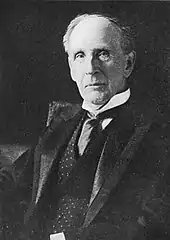 |
The Right Honourable John Morley 1st Viscount Morley of Blackburn OM PC FRS (1838–1923) |
7 November 1910 |
5 August 1914 |
|
Liberal | |||
 |
The Right Honourable William Lygon 7th Earl Beauchamp KG KCMG PC (1872–1938) |
5 August 1914 |
25 May 1915 |
Liberal | ||||
 |
The Most Honourable Robert Crewe-Milnes 1st Marquess of Crewe KG PC FSA (1858–1945) |
25 May 1915 |
10 December 1916 |
|
Liberal | Asquith Coalition (Lib.–Con.–Lab.) | ||
 |
The Right Honourable George Curzon 1st Earl Curzon of Kedleston KG GCSI GCIE PC (1859–1925) |
10 December 1916 |
23 October 1919 |
|
Conservative | Lloyd George (I & II) (Lib.–Con.–Lab.) | ||
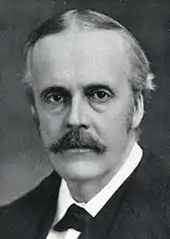 |
The Right Honourable Arthur Balfour 1st Earl of Balfour[nb 17] KG OM PC FRS DL (1848–1930) |
23 October 1919 |
19 October 1922 |
Conservative | ||||
 |
The Most Honourable James Gascoyne-Cecil 4th Marquess of Salisbury KG GCVO CB PC DL (1861–1947) |
24 October 1922 |
22 January 1924 |
|
Conservative | Law | ||
| Baldwin I | ||||||||
 |
The Right Honourable Charles Cripps 1st Baron Parmoor KCVO PC QC (1852–1941) |
22 January 1924 |
3 November 1924 |
Labour | MacDonald I | |||
 |
The Most Honourable George Curzon 1st Marquess Curzon of Kedleston KG GCSI GCIE PC (1859–1925) |
6 November 1924 |
27 April 1925 |
|
Conservative | Baldwin II | ||
 |
The Right Honourable Arthur Balfour 1st Earl of Balfour KG OM PC FRS DL (1848–1930) |
27 April 1925 |
4 June 1929 |
Conservative | ||||
 |
The Right Honourable Charles Cripps 1st Baron Parmoor KCVO PC QC (1852–1941) |
7 June 1929 |
24 August 1931 |
|
Labour | MacDonald II | ||
.jpg.webp) |
The Right Honourable Stanley Baldwin JP FRS MP for Bewdley (1867–1947) |
25 August 1931 |
7 June 1935 |
Conservative | National I (N.Lab.–Con.–Lib.N. –Lib. | |||
| National II (N.Lab.–Con.–Lib.N. –Lib. until 1932) | ||||||||
| | .jpg.webp) |
The Right Honourable Ramsay MacDonald FRS MP for Combined Scottish Universities[nb 20] (1866–1937) |
7 June 1935 |
28 May 1937 |
National Labour | National III (Con.–N.Lab.–Lib.N.) | ||
Edward VIII.svg.png.webp) (1936) | ||||||||
George VI.svg.png.webp) (1936–1952) | ||||||||
 |
The Right Honourable Edward Wood 3rd Viscount Halifax PC (1881–1959) |
28 May 1937 |
9 March 1938 |
|
Conservative | National IV (Con.–N.Lab.–Lib.N.) | ||
 |
The Right Honourable Douglas Hogg 1st Viscount Hailsham PC KC (1872–1950) |
9 March 1938 |
31 October 1938 |
Conservative | ||||
 |
The Right Honourable Walter Runciman 1st Viscount Runciman of Doxford PC (1870–1949) |
31 October 1938 |
3 September 1939 |
National Liberal | ||||
 |
The Right Honourable James Stanhope 7th Earl Stanhope KG DSO MC PC (1880–1967) |
3 September 1939 |
11 May 1940 |
|
Conservative | Chamberlain War (Con.–N.Lab.–Lib.N.) | ||
 |
The Right Honourable Neville Chamberlain FRS MP for Birmingham Edgbaston (1869–1940) |
11 May 1940 |
3 October 1940 |
Conservative | Churchill War (All parties) | |||
 |
The Right Honourable John Anderson GCB GCSI GCIE FRS MP for Combined Scottish Universities (1882–1958) |
3 October 1940 |
24 September 1943 |
National | ||||
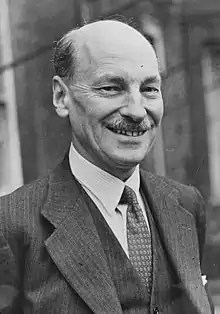 |
The Right Honourable Clement Attlee CH FRS MP for Limehouse (1883–1967) |
24 September 1943 |
23 May 1945 |
Labour | ||||
 |
The Right Honourable Frederick Marquis 1st Baron Woolton CH PC (1883–1964) |
25 May 1945 |
26 July 1945 |
National | Churchill Caretaker (Con.–Lib.N.) | |||
 |
The Right Honourable Herbert Morrison MP for Lewisham South[nb 22] (1888–1965) |
27 July 1945 |
9 March 1951 |
|
Labour | Attlee (I & II) | ||
.jpg.webp) |
The Right Honourable Christopher Addison 1st Viscount Addison KG PC FRCS (1869–1951) |
9 March 1951 |
26 October 1951 |
|
Labour | |||
 |
The Right Honourable Frederick Marquis 1st Baron Woolton CH PC (1883–1964) |
28 October 1951 |
25 November 1952 |
Conservative | Churchill III | |||
Elizabeth II (1952–2022) | ||||||||
 |
The Most Honourable Robert Gascoyne-Cecil 5th Marquess of Salisbury KG PC (1893–1972) |
25 November 1952 |
29 March 1957 |
|
Conservative | |||
| Eden | ||||||||
| Macmillan (I & II) | ||||||||
.jpg.webp) |
The Right Honourable Alec Douglas-Home 14th Earl of Home PC (1903–1995) |
29 March 1957 |
17 September 1957 |
|
Conservative | |||
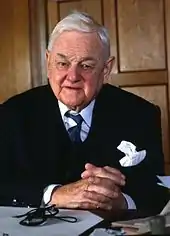 |
The Right Honourable Quintin Hogg 2nd Viscount Hailsham PC QC (1907–2001) |
17 September 1957 |
14 October 1959 |
Conservative | ||||
.jpg.webp) |
The Right Honourable Alec Douglas-Home 14th Earl of Home PC (1903–1995) |
14 October 1959 |
27 July 1960 |
|
Conservative | |||
 |
The Right Honourable Quintin Hogg QC MP for St Marylebone[nb 23] (1907–2001) |
27 July 1960 |
16 October 1964 |
Conservative | ||||
| Douglas-Home | ||||||||
| The Right Honourable Herbert Bowden CBE MP for Leicester South West (1905–1994) |
16 October 1964 |
11 August 1966 |
|
Labour | Wilson (I & II) | |||
 |
The Right Honourable Richard Crossman CBE MP for Coventry East (1907–1974) |
11 August 1966 |
18 October 1968 |
|
Labour | |||
| The Right Honourable Fred Peart MP for Workington (1914–1988) |
18 October 1968 |
19 June 1970 |
|
Labour | ||||
 |
The Right Honourable William Whitelaw MC DL MP for Penrith and The Border (1918–1999) |
20 June 1970 |
7 April 1972 |
|
Conservative | Heath | ||
| The Right Honourable Robert Carr MP for Mitcham (1916–2012) |
7 April 1972 |
5 November 1972 |
|
Conservative | ||||
| The Right Honourable Jim Prior MP for Lowestoft (1927–2016) |
5 November 1972 |
4 March 1974 |
|
Conservative | ||||
 |
The Right Honourable Edward Short MP for Newcastle upon Tyne Central (1912–2012) |
5 March 1974 |
8 April 1976 |
|
Labour | Wilson (III & IV) | ||
.jpg.webp) |
The Right Honourable Michael Foot MP for Ebbw Vale (1913–2010) |
8 April 1976 |
4 May 1979 |
|
Labour | Callaghan | ||
 |
The Right Honourable Christopher Soames Baron Soames GCMG GCVO CH CBE PC (1920–1987) |
5 May 1979 |
14 September 1981 |
|
Conservative | Thatcher I | ||
.jpg.webp) |
The Right Honourable Francis Pym MC MP for Cambridgeshire (1922–2008) |
14 September 1981 |
7 April 1982 |
|
Conservative | |||
| The Right Honourable John Biffen MP for Oswestry (1930–2007) |
7 April 1982 |
11 June 1983 |
|
Conservative | ||||
 |
The Right Honourable William Whitelaw 1st Viscount Whitelaw CH MC DL (1918–1999) |
11 June 1983 |
10 January 1988 |
|
Conservative | Thatcher II | ||
| Thatcher III | ||||||||
 |
The Right Honourable John Wakeham MP for South Colchester and Maldon (born 1932) |
10 January 1988 |
24 July 1989 |
|
Conservative | |||
.jpg.webp) |
The Right Honourable Sir Geoffrey Howe QC MP for East Surrey (1926–2015) |
24 July 1989 |
1 November 1990 |
|
Conservative | |||
 |
The Right Honourable John MacGregor OBE MP for South Norfolk (born 1937) |
2 November 1990 |
10 April 1992 |
|
Conservative | |||
| Major I | ||||||||
| The Right Honourable Tony Newton OBE PC DL MP for Braintree (1937–2012) |
10 April 1992 |
2 May 1997 |
|
Conservative | Major II | |||
 |
The Right Honourable Ann Taylor PC MP for Dewsbury (born 1947) |
2 May 1997 |
27 July 1998 |
|
Labour | Blair I | ||
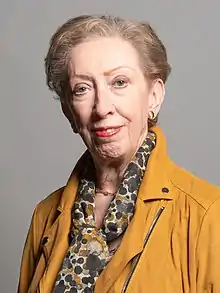 |
The Right Honourable Margaret Beckett MP for Derby South (born 1943) |
27 July 1998 |
8 June 2001 |
|
Labour | |||
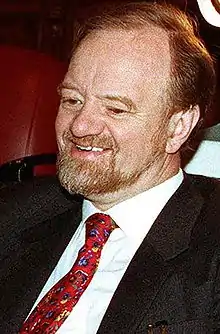 |
The Right Honourable Robin Cook MP for Livingston (1946–2005) |
8 June 2001 |
18 March 2003 |
|
Labour | Blair II | ||
 |
The Right Honourable John Reid MP for Hamilton North and Bellshill (born 1947) |
4 April 2003 |
13 June 2003 |
|
Labour | |||
 |
The Right Honourable Gareth Williams Baron Williams of Mostyn PC QC (1941–2003) |
13 June 2003 |
20 September 2003 |
|
Labour | |||
 |
The Right Honourable Valerie Amos Baroness Amos PC (born 1954) |
6 October 2003 |
27 June 2007 |
|
Labour | |||
| Blair III | ||||||||
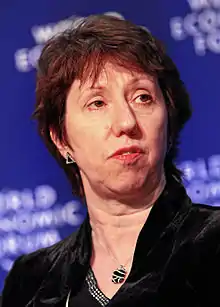 |
The Right Honourable Catherine Ashton Baroness Ashton of Upholland PC (born 1956) |
28 June 2007 |
3 October 2008 |
|
Labour | Brown | ||
 |
The Right Honourable Janet Royall Baroness Royall of Blaisdon PC (born 1955) |
3 October 2008 |
5 June 2009 |
|
Labour | |||
 |
The Right Honourable Peter Mandelson Baron Mandelson PC (born 1953) |
5 June 2009 |
11 May 2010 |
|
Labour | |||
 |
The Right Honourable Nick Clegg MP for Sheffield Hallam (born 1967) |
11 May 2010 |
8 May 2015 |
Liberal Democrat | Cameron–Clegg (Con.–Lib.Dem.) | |||
 |
The Right Honourable Chris Grayling MP for Epsom and Ewell (born 1962) |
9 May 2015 |
14 July 2016 |
|
Conservative | Cameron II | ||
 |
The Right Honourable David Lidington CBE MP for Aylesbury (born 1956) |
14 July 2016 |
11 June 2017 |
|
Conservative | May I | ||
 |
The Right Honourable Andrea Leadsom MP for South Northamptonshire (born 1963) |
11 June 2017 |
22 May 2019 |
|
Conservative | May II | ||
 |
The Right Honourable Mel Stride MP for Central Devon (born 1961) |
23 May 2019 |
24 July 2019 |
|
Conservative | May II | ||
 |
The Right Honourable Jacob Rees-Mogg MP for North East Somerset (born 1969) |
24 July 2019 |
8 February 2022 |
|
Conservative | Johnson (I & II) | ||
 |
The Right Honourable Mark Spencer MP for Sherwood (born 1970) |
8 February 2022 |
6 September 2022 |
|
Conservative | Johnson (II) | ||
| |  |
The Right Honourable Penny Mordaunt MP for Portsmouth North (born 1973) |
6 September 2022 |
Incumbent |
|
Conservative | Truss | |
Charles III (2022–present) | ||||||||
| Sunak | ||||||||
Notes
- Marquess of Carmarthen from 1689, created Duke of Leeds in 1694
- Served as Secretary of State for the Northern Department from February 1721
- Served as Secretary of State for the Northern Department from November 1744
- Lord Lieutenant of Ireland from December 1750
- The Prince of Wales served as Prince Regent from 5 February 1811.
- Baron Camden from 1765; created Earl Camden and Viscount Bayham in 1786[14]
- Lord Privy Seal until February 1798
- Earl of Ripon and Earl de Grey from 1859; created Marquess of Ripon in 1871[15]
- Served Leader of the House of Lords until August 1876
- Served as Lord Lieutenant of Ireland from May 1882
- Served as Lord Privy Seal until March 1885
- Served as Secretary of State for War from January 1886
- Served as President of the Board of Education March 1900 – July 1902
- Served as Leader of the House of Lords from July 1902
- Served as Secretary of State for India March 1911– May 1911
- Served as President of the Board of Trade from August 1916
- MP for City of London until 1922; thereafter created Earl of Balfour and Viscount Traprain and joined the House of Lords[16]
- Served as Chancellor of the Duchy of Lancaster until May 1923
- Served as Lord Privy Seal September 1932 – December 1933
- MP for Seaham until 1935; returned to Parliament as MP for Combined Scottish Universities in 1936[17]
- Served as Secretary of State for Foreign Affairs from February 1938
- MP for Lewisham East until 1950; MP for Lewisham South thereafter.[18]
- Viscount Hailsham until 1963 when disclaimed under the Peerage Act 1963; returned to Parliament as MP for St. Marylebone in 1963[19]
- Served as Leader of the House of Lords until October 1963
- Served as Minister for Science from October 1963 – April 1964
- Served as Secretary of State for Education and Science from April 1964
- With special responsibility for political and constitutional reform
See also
- Privy Council Office
- Vice-President of the Executive Council
- President of the King's Privy Council for Canada
- Sinecure
References
Citations
- "Privy Council: Guide to its origins, powers and members". BBC News. 8 October 2015. Retrieved 1 January 2018.
The body convenes, on average, about once a month and its meetings – known as councils – are presided over by The Queen.
- Fryde, E. B. (1986) [1941]. Handbook of British Chronology. Cambridge: Cambridge University Press.
- 21 Hen. 8, c.20
- Seldon, Anthony; Meakin, Jonathan; Thoms, Illias (2021). The Impossible Office? The History of the British Prime Minister. Cambridge University Press. p. 157. ISBN 9781316515327.
- Norton, Philip (2020). Governing Britain: Parliament, Ministers and Our Ambiguous Constitution. Manchester University Press. p. 144. ISBN 9-781526-145451.
- Hennessy, Peter. The Prime Minister: The Office and Its Holders Since 1945 (2000), pp.189–190.
- Hennessy, p.191
- Hennessy, p. 193
- Viscount Samuel (18 May 1954). "Her Majesty's Return". Parliamentary Debates (Hansard). Vol. 187. House of Lords. col. 645.
... there has been constitutional work done, there have been acts of State: ... meetings of the Privy Council, an organ of the Constitution older than Parliament itself, for wherever the Sovereign is, and three Privy Counsellors are present, there may be meetings of the Council and Orders passed. So, during this tour there have been sessions of the Privy Council in Australia, in New Zealand and in Ceylon, with their own local Privy Council members – members of the one single Imperial Privy Council, but their own local members.
- Cox, Noel (1998–1999). "The Dichotomy of Legal Theory and Political Reality: The Honours Prerogative and Imperial Unity". Australian Journal of Law and Society. 1 (14): 15–42. Retrieved 19 November 2011.
The Queen has in fact regularly presided over meetings of the Privy Council in New Zealand, since her first in 1954. That was the first held by the Sovereign outside the United Kingdom, although in 1920 Edward Prince of Wales held a Council in Wellington to swear in the Earl of Liverpool as Governor-General.
- Kumarasingham, Harshan (2010). Onward with Executive Power: Lessons from New Zealand 1947–57 (PDF). Wellington, New Zealand: Institute of Policy Studies, Victoria University of Wellington. p. 71. ISBN 978-1-877347-37-5. Archived from the original (PDF) on 11 January 2012. Retrieved 19 November 2011.
The Queen held a meeting of the Privy Council [on 13 January 1954] at the 'Court at Government House at Wellington' with her New Zealand prime minister as 'acting Lord President' of the council. The deputy prime minister, Keith Holyoake, 'secured for himself a place in constitutional history by becoming the first member to be sworn of Her Majesty’s Council outside the United Kingdom'.
- "Election 2017: Prime Minister and Cabinet appointments". GOV.UK. Retrieved 9 September 2017.
- "Universities". Privy Council. 1 January 2005. Archived from the original on 9 September 2017. Retrieved 9 September 2017.
- "No. 12750". The London Gazette. 9 May 1786. p. 201.
- "No. 23748". The London Gazette. 20 June 1871. p. 2847.
- "No. 32691". The London Gazette. 5 May 1922. p. 3512.
- "No. 15252". The Edinburgh Gazette. 4 February 1936. p. 134.
- "No. 39372". The London Gazette. 30 October 1951. p. 5663.
- "No. 43180". The London Gazette. 10 December 1963. p. 10099.
Sources
- Chisholm, Hugh, ed. (1911). "Lord President of the Council". Encyclopædia Britannica (11th ed.). Cambridge University Press.
.svg.png.webp)